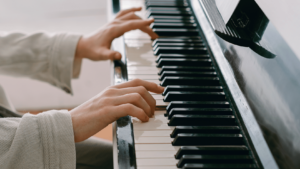Whether you’re auditioning for a prestigious music school, a competitive music program, or a local talent competition, Lessons In Your Home is here to guide piano students every step of the way. Auditions can be nerve-wracking, but with the right preparation and guidance from our experienced teachers, you can turn that anxiety into confidence and success. So, what does it take to ace a piano audition? Let’s dive in.
Planning Your Audition
Choosing Your Repertoire and Creating a Timeline
The first crucial step in preparing for a piano audition is selecting your repertoire and creating a preparation timeline. Depending on the audition’s requirements and level of difficulty, you may need anywhere from a month to over a year to prepare.
Pro Tip: Always allocate at least 25% of your preparation time for performance practice. While learning and memorizing the pieces are vital, simulating the actual audition environment is equally important for your success.
The Art of Practicing
Listen Before You Leap
Before you even touch the piano keys, immerse yourself in the pieces you’ll be performing. Listen to multiple recordings from various artists to understand different interpretations. Choose one recording that resonates with your artistic vision and make it your go-to reference during your practice sessions.
The Woodshedding Phase
Woodshedding, or mastering the basics, is your first hands-on step. Slow, deliberate practice with meticulous attention to detail will save you time and frustration later. Focus on aspects like fingering, notes, rhythm, and dynamics from the get-go.
Question: Are you practicing the right way or just reinforcing bad habits?
Memorization Techniques
Once you’re comfortable with the basics, it’s time to commit the pieces to memory. There are three primary types of memory you’ll use:
- Muscle Memory: Developed through accurate repetition.
- Aural Memory: Knowing how the piece should sound.
- Visual Memory: Watching your hand movements or visualizing the sheet music.
Personal Insight: I’ve found that a combination of these memory types works best, especially when nerves kick in during a performance.
Performance Practice
You’ve learned the pieces and memorized them, but how do you perform under pressure? Start small by performing for friends or family, then gradually increase the audience size to include people who make you a bit nervous. Recording your performances and reviewing them can offer invaluable insights into areas that may need further polishing.
Remember: Practice doesn’t make perfect; it makes permanent. Make sure you’re practicing the right things.
The Big Day
On the day of the audition, focus on slow practice over tricky spots but avoid over-practicing. During the audition, concentrate on your breathing, musicality, and the hard work you’ve invested in your preparation.
Contact Us
Ready to take your piano skills to the next level? Contact Lessons In Your Home for more information on piano lessons in Houston and beyond. Our team is here to answer all your questions and help you set up your lessons!
